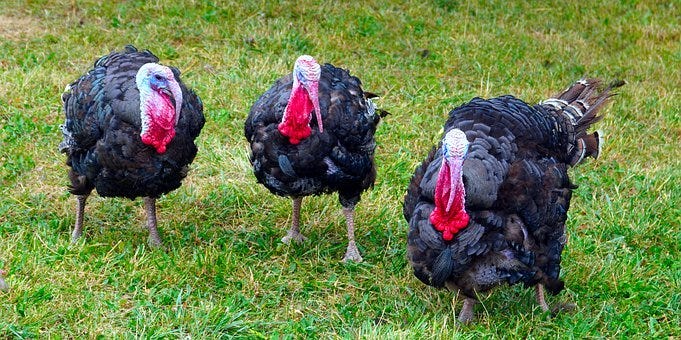As we all prepare for a pandemic-constrained Thanksgiving season, I’ve chosen a November read and guest who are particularly well suited to talk about food and community.

We’ll be reading Michael Pollan’s essay “The Sickness in Our Food Supply” from the New York Review of Books. Here’s a preview:
Under normal circumstances, the modern hog or chicken is a marvel of brutal efficiency, bred to produce protein at warp speed when given the right food and pharmaceuticals. So are the factories in which they are killed and cut into parts. These innovations have made meat, which for most of human history has been a luxury, a cheap commodity available to just about all Americans; we now eat, on average, more than nine ounces of meat per person per day, many of us at every meal.
Covid-19 has brutally exposed the risks that accompany such a system. There will always be a tradeoff between efficiency and resilience (not to mention ethics); the food industry opted for the former, and we are now paying the price.
Imagine how different the story would be if there were still tens of thousands of chicken and pig farmers bringing their animals to hundreds of regional slaughterhouses. An outbreak at any one of them would barely disturb the system; it certainly wouldn’t be front-page news. Meat would probably be more expensive, but the redundancy would render the system more resilient, making breakdowns in the national supply chain unlikely. Successive administrations allowed the industry to consolidate because the efficiencies promised to make meat cheaper for the consumer, which it did. It also gave us an industry so powerful it can enlist the president of the United States in its efforts to bring local health authorities to heel and force reluctant and frightened workers back onto the line.
I appreciate this Pollan essay because he’s looking at where the pandemic is exposing injustices and dangers that we ignored in “ordinary” times, because we accepted them as normal. I want to recommend Breaking Ground, a collaboration between Comment and Plough, which focuses on how we can build back better after coronavirus. I wrote for the project on the invisible wounds forced into visibility by the pandemic.

Our guest this month, Gracy Olmstead, has a gift for seeing the dignity in small details. She is the author of the forthcoming Uprooted: Recovering the Legacy of the Places We've Left Behind. The place that she left behind is Emmett, Idaho—she now lives in Washington D.C. and is a freelance journalist with a focus on farming, localism, and family.
Gracy has a newsletter of her own (Granola) where she sends out a monthly collection of good essays, good recipes, and letters from readers. And, if you’d like a full-size book club in addition to this Tiny one, she’ll be hosting one on Marilynne Robinson’s Jack this month.
I look forward to seeing your responses to Pollan’s essay, and I’ll use your comments below to guide the questions I write for Gracy. And, appropriately enough, I’m also looking forward to finding out what’s in my final farmshare box of the season this week.
Ex libris,
Leah




It's a barnstormer of a piece!
At the end, Pollan says, "For even when our food system is functioning “normally,” reliably supplying the supermarket shelves and drive-thrus with cheap and abundant calories, it is killing us—slowly in normal times, swiftly in times like these. The food system we have is not the result of the free market. (There hasn’t been a free market in food since at least the Great Depression.) No, our food system is the product of agricultural and antitrust policies—political choices—that, as has suddenly become plain, stand in urgent need of reform."
I agree, and I'm interested: How can we be part of the reform? As regular Americans, buyers and eaters of food, how can we help make our food supply less exploitative and unhealthy? Very interested in any concrete advice or first steps Gracy Olmstead is up to suggest!
Love the Pollan/Olmstead combo and can’t wait to follow this discussion!! Great choice Leah!!
This article made me think about how radically my own food system and diet have changed this year. The pandemic didn’t change the structural limitations I’ve faced that much, actually—if you don’t have a car, you’re functionally in a food desert in most of America. But it did make me more intentional about facing those limitations. I switched from grocery delivery to farmshare, buying exclusively from local producers with established routes through my community.
To be honest, what this changed for me was first and foremost the emotional/mental labor on the “front end” of my home kitchen. As someone who has long struggled with anxiety-related food issues, being able to avoid meal planning entirely and simply learn to work with whatever is available that week has been so life-giving. Yes, I’ve learned more about my local food system and climate and the seasons and whatnot…. Yes, local food systems are more resilient than national/international ones…. But honestly what this really did was make *me* more resilient. I always thought I “hated” cooking or was “bad at it.” Now that I’m working in a more natural rhythm, applying a set of various cooking methods to Whatever Happens To Be In Season, I’m much happier. Plus, eating more fresh fruits and veggies made me feel physically healthier than I have in years. I actually have the energy to cook now that I’m not so stressed over it!
In other words, I definitely accepted "nourishment is a chore" as one of those ordinary injustices before the pandemic hit. Seeing it as a tool in my resilience kit is so much more just. I’d love to hear more about food & resilience on this level, too - not just the international / national / local food systems level, but the domestic / household level.